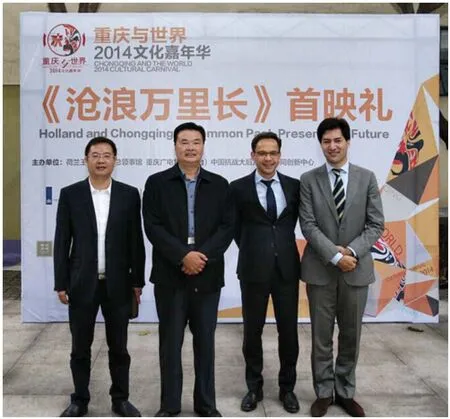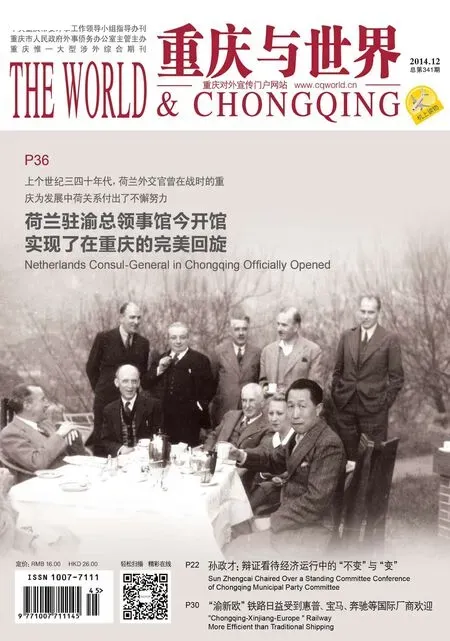荷兰外交官祖孙四代与重庆的“跨国之缘”
□ 文/本刊记者 李静
荷兰外交官祖孙四代与重庆的“跨国之缘”
□ 文/本刊记者 李静
2014年10月18日,一位荷兰籍人士将他祖辈张增福遗存的一件在1944年4月由荷兰著名外交家、汉学家、小说家——高罗佩先生书写的“博通南海”书法卷轴无偿捐赠给了重庆中国三峡博物馆。
2012年中荷两国建立大使级外交关系40周年之际,这名荷兰籍友人受荷兰王国驻北京大使馆之邀,撰写了记录荷兰外交使团在战时重庆活动的历史著作《旧日重庆中的荷兰影像(1938-1946)》,并于2013年底由荷兰驻中国大使馆出版。
2014年,在迎接荷兰驻重庆总领事馆正式开馆的时候,荷兰驻重庆总领事谭敬南提议,以这本书为基础,拍摄一部记录中荷二战时期关系和友谊的纪录片。片中以高罗佩与这位荷兰籍友人的祖辈张增福、张曾庐为两条主线,还原过去几十年,他们及子孙后代人生轨迹在世界多个地方的相互交叠。10月30日,这部电视纪录片《沧浪万里长》(《荷兰人在重庆的足迹》)首映式在重庆天地文化剧场举行。
这位荷兰籍友人是谁呢?

张克雷(右一)参加《沧浪万里长》首映式。

张克雷寻访旧时祖辈的足迹。
战时陪都 荷兰外交官的重庆情缘
在关于重庆与荷兰之间发生的事件中,一位荷兰籍友人的名字被多次提到,并成为每次事件中的主角,让我们不得不对他产生浓厚的兴趣,于是,一个名字出现在人们的视野。他,就是张克雷。
Vincent Chang,一个土生土长的荷兰人,也是有着一半中国血统的混血儿:黑眼睛、黑头发,面部轮廓分明,身材高大,张克雷是他的中文名。
2003年,张克雷第一次来到中国。刚到这里,他就被这个古老而神奇的国度所吸引。2005年,他辞去律师的工作来到北京开始学习汉语。对于张克雷来说,来到中国也是为了圆父母的一个梦。
张曾庐,就是张克雷的爷爷,在抗日战争时期担任中国驻荷兰外交官。从1929年起,张曾庐和张克雷的大爷爷张增福便供职于外交部。其中,张增福在外交界更为活跃,与民国元老于右任、荷兰外交官杨连山、著名汉学家高罗佩等人都有深厚的交情。1938年,随着国民政府西迁,张曾庐一家从南京搬到重庆,并在重庆生活了7年之久。张克雷的姑姑、父亲都出生在这里。
1945年,张曾庐被中国政府任命为驻荷兰大使馆外交官,家属也随之同行。张家从此远离故土,张曾庐最终在远离故土万里之遥的库拉索岛逝世。张克雷从小在荷兰长大,和住在库拉索岛的爷爷奶奶并不常见面,他们也很少向他提及在重庆的往事,尽管如此,张克雷从小就对自己身上流淌的中国血脉好奇万分。
而在其父亲——张天鸣身上,张克雷总会发现,在父亲绝大多数证件和个人资料上,如护照、身份证、结婚证,甚至驾照,出生地都标有“Chongqing”(重庆)两字。但父亲对重庆却知之甚少。父亲告诉他,自己虽然出生于重庆,但在1岁时便跟张克雷的爷爷、奶奶来到欧洲,所以对重庆已经没有丝毫印象了。
2008年4月,张克雷第一次来到重庆“寻根”。刚到重庆,他就被眼前的景象惊呆了:“这么大的一座城市,为什么会没有多少人知道?”张克雷不禁感叹重庆的巨大。
重庆寻根 迷上重庆与荷兰历史
因为对祖辈与父辈的历史产生了浓厚的兴趣,2008年4月,张克雷第一次来到重庆“寻根”。刚到重庆,他就被眼前的景象惊呆了:“这么大的一座城市,为什么会没有多少人知道?”张克雷不禁感叹重庆的巨大。
在寻找父亲对重庆曾经的记忆过程中,张克雷对这里产生了深厚的感情。重庆,成了他的第二故乡。虽然初次“寻根”所获非常有限,不过,在他看来,这次寻找本身比结果更有意义。“正是这第一次与重庆接触,让我对这座城市和这里的人们产生了强烈的好感。在这里,我遇到了很多无私帮助我的人,我开始真正了解这座城市和我自己。”张克雷说。
2010年,张克雷与他的太太再次来到重庆,并与重庆大学进行项目合作,受邀兼职授课国际法律及欧盟法律等课程。当然,张克雷仍然不忘自己的“寻根”任务。假期,夫妻两人还去了南京和北京收集相关的档案材料。在重庆,他们去了三峡博物馆、磁器口、大足石刻、南温泉等地方,越走近这座城市,好奇心就越强,也就越发喜爱它。
经过几年的“寻根之旅”,张克雷开始执着于对战时重庆外交及近代中荷关系等领域的研究。为此,他联系了许多曾在战时重庆荷兰大使馆工作过的外交官后代,如高罗佩(1943-1946年在荷兰驻重庆使馆工作)的儿子高惠连、女儿保琳,杨连山(1939-1946年在重庆工作)的儿子杨乐兰等,他们提供了很多照片、图纸、信件、公文、地图等等。这些珍贵的历史资料,对张克雷的研究很有帮助。
再现历史 致力重庆-荷兰经济文化交流
经过多年的研究和学习,张克雷已慢慢成为一名通晓重庆与荷兰历史的专家,甚至像一名使者,时时传递着两地的讯息,帮助沟通交流。
2012年,张克雷正式加入了中国抗战大后方研究协同创新中心。2013年9月,张克雷参加了在重庆召开的中日战争国际共同研究第五次会议,来自美国、英国、日本、韩国、澳大利亚等国家和地区的90余位著名学者齐聚一堂,就“第二次世界大战背景下的中日战争”进行了主题交流和探讨。作为代表荷兰的国际学者,张克雷发表了题为《回顾战时重庆——大国崛起下的国际之都》的学术报告。他国际化的研究视野和独特的观点,获得了到场专家学者的一致肯定。
在荷兰驻渝领事馆选址期间,饱含着对重庆多年感情的张克雷积极推荐重庆,并帮助在重庆设立领馆作了许多研究筹备工作。除此以外,张克雷还为有意投资重庆的荷兰公司提供咨询与帮助,同时让更多的重庆企业投资荷兰。“我认为目前两地在物流领域的机会很大,还有高科技农业、城市规划、工业设计、化学以及园艺等,荷兰在这些方面都有比较成熟的经验与技术,可以与重庆分享合作。”张克雷说。
此外,受荷兰王国驻华大使馆之邀,张克雷撰写了荷兰外交使团在战时重庆活动的历史回顾——《旧日重庆中的荷兰影像(Dutch Traces, Places and Faces In Chongqing 1938-1946)》,耗时接近两年,目前该书已完稿,并于荷兰驻重庆总领事馆开馆时正式与读者见面。“我想要通过这本书向西方世界讲述重庆,讲述它在二战中扮演的角色,而这段历史曾经被西方遗忘。我想让荷兰乃至西方国家更多地了解重庆,这是我的梦想。”张克雷说。
从一名工作稳定、收入颇丰的律师,到致力于中国与荷兰的文化历史及经济交流的“使者”,张克雷奔波于荷兰海牙、法国巴黎以及北京、台北、重庆等地,查阅档案,考证文献,实地考察,最终还原了湮没在历史尘烟中的家族历史。张克雷坦承完成这一切需要很大的勇气,也得到了家人积极的支持。如今,他的第一个儿子也在重庆出生,他给儿子取名为张杰仁。他也会时不时地教儿子中文,讲述关于中国的故事。现在,三岁的儿子能用汉语熟练地说:“我叫张杰仁,我出生在重庆。”
“我希望能将我现在所做的一切变为我的终身事业,为重庆与荷兰之间的交流沟通贡献我的一份力量,选择这样的职业不是为了金钱,而是为了让我的人生更充实,更有价值。”张克雷这样说道。
在谈到对重庆的建议时,张克雷表示,重庆需要更多地宣传,才能更加国际化。采访结束时,张克雷微笑着表示,希望未来可以在荷兰的大学里设立一个关于研究重庆与荷兰历史的课程,让更多的荷兰人了解这段历史,了解重庆。
Vincent Chang is a native of the Netherlands, but is also half Chinese, tall, with dark eyes and dark hair. Zhang Kelei is his Chinese name.
Vincent fi rst came to China in 2003. He was attracted to this ancient and mysterious country upon his fi rst arrival. In 2005 he resigned from his attorney position and went to Beijing to study the Chinese language. For him, coming to China was like fulfi lling his parents’ dream.
Zhang Zenglu, Vincent’s grandfather, served as Chinese ambassador to the Netherlands during the war. He served in the Ministry of Foreign Affairs, beginning in 1929. In 1938, when the Nationalist government moved west to Chongqing, Zhang Zenglu also moved with his family from Nanjing and lived in Chongqing for seven years, during which time Vincent’s aunt and father were born.
Vincent Chang grew up in the Netherlands and never heard his grandparents, who lived in Curacao, talk about their past in Chongqing. However, Vincent was always curious about his Chinese heritage. He learned some from documents of his father, Zhang Tianming, his father’s ID and personal information, such as passports, identity cards, marriage certificates and a driver’s license. Even though his father’s place of birth is marked“Chongqing”, his father knew little about Chongqing, since he left the city at the age of one.
Seeking His Roots in the History Between Chongqing and the Netherlands
In April, 2008, Vincent fi rst came to Chongqing to seek his roots. He was amazed by such a large city. While searching for his father’s history he began to develop deep feelings for the city. “I met a lot of friendly people here. I really got to know the city and myself even more,” Vincent said.
In 2010, Vincent and his wife returned to Chongqing again to work on a project with Chongqing University. He was also invited to work part-time, teaching courses on international law and European Union law, but he never forgot his root-seeking project. Vincent and his wife traveled to Nanjing and Beijing to collect relevant archival materials. In Chongqing they went to the Three Gorges Museum, Ciqikou, Dazu rock carvings, South hot springs and other places. The longer they stayed in the city, the more their curiosity increased and the stronger their love for Chongqing grew.
After several years of searching for his roots, Vincent became engrossed in the study of diplomatic relations during the war, Sino-Dutch relations in modern times and other related fi elds. He contacted a number of offspring of Netherlands diplomatic offi cers who formerly worked in the Netherlands Embassy in Chongqing during the war, such as the son and daughter of Robert Hans van Gulik and the son of J van den Berg, who provided a great deal of photos, drawings, letters, documents and maps. These rare historical documents were invaluable for Vincent’s research.
Dedication to Cultural History and Exchanges Between Chongqing and the Netherlands
After years of research and study, Vincent has become an expert in the history between Chongqing and the Netherlands, helping communications between the two. In 2012, Vincent offi cially joined the Chinese Anti-Japanese Research Collaborative Innovation Center. In September, 2013, he participated in the fifth meeting of the International Joint Study of the Sino-Japanese War, which was held in Chongqing. As representative of Netherlands International scholar, he delivered the academic report about Chongqing, “The International City Under the Rise of Great Powers in the Wartime.” His vision of internationalizing research and his unique perspective were unanimously affi rmed by experts and scholars.

张克雷参加收藏文物捐赠仪式。
During the time the Netherlands was selecting the site for their Consulate-general, Vincent actively recommended Chongqing and made many preparations helping set up the consulate in Chongqing. He now provides advice and assistance to Netherlands companies planning to invest in Chongqing and encourages more Chongqing enterprises to invest in the Netherlands. “I think the opportunities for cooperation in the industrial fi eld are very large, including high-tech agriculture and gardening, urban planning, industrial design and chemistry. The Netherlands has mature experience and techniques in these fi elds which could be shared with Chongqing companies.”
Vincent authored a book about the history of the Netherlands diplomatic corps in Chongqing during the war, Dutch Traces, Places and Faces in Chongqing, 1938-1946 at the invitation of the Netherlands Embassy in China. It took nearly two years to complete the book. Now published, it was first presented to readers on the day of the official opening ceremony of the Netherlands Consulate General in Chongqing. “I want to spread the word to the western world about Chongqing and its role in World War II through this book. This history has been long forgotten by western countries. “I’d like the Netherlands and other western countries to know more about Chongqing, so this is my dream come true.”
From a stable, well paid lawyer to an expert dedicated to cultural history and economic exchanges between China and the Netherlands, Vincent has traveled to the Hague, Paris, Taipei, Beijing, Chongqing and other places to gain access to archives, to research documents and eventually recreate the family history. He admits that all of this took a lot of courage, but he has had the full support of his family. Now, his fi rst son, born in Chongqing, is named Zhang Jieren. Vincent teaches him Chinese and tells him stories about China. At three years old, he can speak some words in Chinese, “Wo shi Zhang Jieren, wo chu sheng zai Chongqing.”
“I hope to turn everything I do into a career of my own and make a contribution to the communication between China and the Netherlands, making my life more fulfi lling, more valuable.”
When it comes to advice for Chongqing, Vincent said,“Chongqing needs to be more widely publicized and become more international.” At the end of the interview, he told me, with a smile, that he hopes in the future to set up a study course on the history between Chongqing and the Netherlands at the University of Netherlands, so more Netherlanders can understand this period of history and understand more about Chongqing.
Generations of Netherland Diplomats and their Links to Chongqing
War Time Capital Netherlands Diplomat in Chongqing

